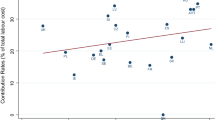Abstract
Although European welfare states receive high levels of public support, insights into what kind of general redistributive principles Europeans would prefer to be applied in welfare provisions—equity, equality or need—is scarce and fragmented. Analysing the 2008 wave of the European Social Survey, we find that most European populations share a preference for applying the equality principle to unemployment benefits. But they are divided over applying equity and equality for pension schemes. Individual determinants of preferences confirm that the ‘haves’ generally prefer equity over equality, while the ‘have-nots’ prefer the need principle more. At the country level, cross-national variation in redistribution preferences is low for unemployment benefits and cannot be explained by relevant context factors; preferences for pension redistribution depends upon its institutional design and social expenditure: welfare generosity curbs the preference for equity.
Access this chapter
Tax calculation will be finalised at checkout
Purchases are for personal use only
Similar content being viewed by others
References
Aalberg, T. (2003). Achieving justice: Comparative public opinion on income distribution. Leiden: Brill.
Albrekt Larsen, C. (2006). The institutional logic of welfare attitudes: How welfare regimes influence public support. Aldershot: Ashgate.
Alesina, A., & Angeletos, G. (2005). Fairness and redistribution. American Economic Review, 95(4), 960–980.
Arts, W., & Gelissen, J. (2001). Welfare states, solidarity and justice principles: Does the type really matter? Acta Sociologica, 44(4), 283–299.
Arts, W., & Gelissen, J. (2002). Three worlds of welfare capitalism or more? A state-of-the-art report. Journal of European Social Policy, 12(2), 137–158.
Blekesaune, M. (2007). Economic conditions and public attitudes to welfare policies. European Sociological Review, 23(3), 393–403.
Clasen, J., & van Oorschot, W. (2002). Changing principles in European social security. European Journal of Social Security, 4(2), 89–116.
d’Anjou, L., Steijn, A., & Van Aarsen, D. (1995). Social position, ideology and distributive justice. Social Justice Research, 8(4), 351–384.
Deutsch, M. (1975). Equity, equality, and need: What determines which value will be used as the basis of distributive justice? Journal of Social Issues, 31(3), 137–150.
Esping-Andersen, G. (1990). The three worlds of welfare capitalism. Princeton: Princeton University Press.
Fleurbaey, M. (1995). Equal opportunity or equal outcome? Economics and Philosophy, 11, 25–55.
Gelman, A., & Hill, J. (2006). Data analysis using regression and multilevel/hierarchical models. Cambridge: Cambridge University Press.
Hoge, D., & Yang, F. (1994). Determinants of religious giving in American denominations. Review of Religious Research, 36, 123–148.
Jaeger, M. M. (2006). Welfare regimes and attitudes towards redistribution: The regime hypothesis revisited. European Sociological Review, 22(2), 157–170.
Jaeger, M. M. (2008). Does left-right orientation have a causal effect on support for redistribution? Causal analysis with cross-sectional data using instrumental variables. International Journal of Public Opinion Research, 20(3), 363–374.
Kangas, O. (1997). Self-interest and the common good: the impact of norms, selfishness and context in social policy opinions. Journal of Socio-Economics, 26(5), 475–494.
Konow, J. (2003). Which is the fairest one of all? A positive analysis of justice theories. Journal of Economic Literature, 41(4), 1188–1239.
Kumlin, S., & Stadelmann-Steffen, I. (2014). How welfare states shape the democratic public: Policy feedback, participation, voting, and attitudes. Cheltenham: Edward Elgar.
Miller, D. (2001). Principles of social justice. Cambridge: Harvard University Press.
Niemelä, H., & Salminen, K. (1995). How to define a pension scheme: A conceptual map to European pension systems. Helsinki: KELA.
Potters, J., Riedl, A., & Tausch, F. (2010). Preferences for redistribution and pensions: What can we learn from experiments? Tilburg: NETSPAR, Tilburg University.
Rawls, J. (1971). A theory of justice. Cambridge: Harvard University Press.
Reeskens, T., & van Oorschot, W. (2013). Equity, equality, or need? A study of popular preferences for welfare redistribution principles across 24 European countries. Journal of European Public Policy, 20(8), 1174–1195.
Regnerus, M., Smith, C., & Sikkink, D. (1998). Who gives to the poor? The influence of religious tradition and political location on the personal generosity of Americans toward the poor. Journal for the Scientific Study of Religion, 37(3), 481–493.
Rothstein, B. (1998). Just institutions matter: The moral and political logic of the universal welfare state. Cambridge: Cambridge University Press.
Svallfors, S. (1997). Worlds of welfare and attitudes to redistribution: A comparison of eight Western nations. European Sociological Review, 13(3), 283–304.
Svallfors, S. (2012). Welfare attitudes in Europe: Cleavages, mechanisms, formations. Stanford: Stanford University Press.
Taylor-Gooby, P. (1985). Public opinion, ideology and state welfare. London: Routledge.
van Oorschot, W. (2006). Making the difference in social Europe: Deservingness perceptions among citizens of European welfare states. Journal of European Social Policy, 16(1), 23–42.
van Oorschot, W., Pfau-Effinger, B., & Opielka, M. (2008). Culture and welfare state: Values and social policy in comparative perspective. Cheltenham: Edward Elgar.
van Oorschot, W., & Meuleman, B. (2012). Welfare performance and welfare support. In S. Svallfors (Ed.), Contested welfare states: Welfare attitudes in Europe and beyond (pp. 25–57). Stanford: Stanford University Press.
van Oorschot, W., Roosma, F., Meuleman, B., & Reeskens, T. (2017). The social legitimacy of targeted welfare: Attitudes to welfare deservingness. Cheltenhalm: Edward Elgar.
Author information
Authors and Affiliations
Corresponding author
Editor information
Editors and Affiliations
Rights and permissions
Copyright information
© 2021 The Author(s)
About this chapter
Cite this chapter
Reeskens, T., van Oorschot, W. (2021). What Welfare Principles Do Europeans Prefer? An Analysis of Their Attitudes Towards Old Age Pensions and Unemployment Benefits. In: Levrau, F., Clycq, N. (eds) Equality . Palgrave Macmillan, Cham. https://doi.org/10.1007/978-3-030-54310-5_9
Download citation
DOI: https://doi.org/10.1007/978-3-030-54310-5_9
Published:
Publisher Name: Palgrave Macmillan, Cham
Print ISBN: 978-3-030-54309-9
Online ISBN: 978-3-030-54310-5
eBook Packages: Social SciencesSocial Sciences (R0)



